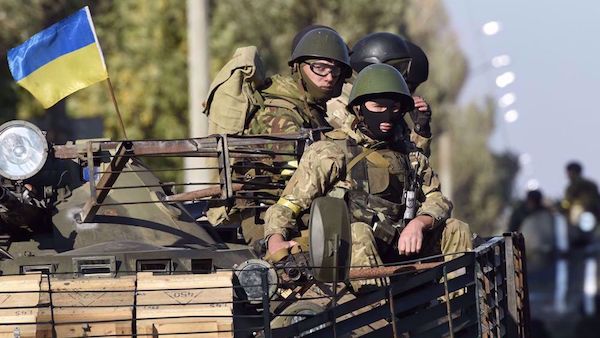
The file photo shows Ukrainian troops in a military parade in the capital, Kiev. (By AFP)
Russian Deputy Foreign Minister Sergei Ryabkov says the escalation of tensions between Moscow and Washington over the situation around Ukraine could culminate in a repeat of the 1962 Cuban missile crisis that pushed the world to the brink of a full-scale nuclear war.
Ryabkov made the comment on Thursday when asked by a reporter if rising tensions over Ukraine could turn into something resembling the Cold War standoff between the United States and the former Soviet Union some six decades ago.
"You know, it really could come to that," Ryabkov was quoted by Russiaís Interfax news agency as saying. "If things continue as they are, it is entirely possible by the logic of events to suddenly wake up and see yourself in something similar."
The Cuban crisis was sparked by the deployment of Soviet nuclear missiles on the Caribbean island and prompted the United States to impose a naval blockade to prevent Moscow shipping in more.
The United States, itself, was deploying at that time similar missiles in Italy and Turkey.
The standoff was resolved after former Soviet leader Nikita Khrushchev agreed to dismantle and remove the nuclear weapons in return for a pledge by then-US President John F. Kennedy not to reinvade the Caribbean island. The US also secretly agreed to remove its nuclear missiles from Turkey, as part of a deal that was not revealed until decades later.
Ryabkovís comment comes as tensions have escalated between Washington and Moscow over Ukraine and the Black Sea region.
The United States, its NATO allies and Ukraine have over the past weeks accused Moscow of enlarging the number of troops near Ukraineís border for a possible invasion. Russia has dismissed the allegation, but it has warned against any provocation from Ukraine.
Moscow says Washington is involved in aggressive moves in the Black Sea, where Ukraine and the United States have held military drills recently.
Russian President Vladimir has previously warned the West and Kiev against crossing the Kremlinís red lines over staging military exercises and sending weaponry to Ukraine.
Putin and his American counterpart, Joe Biden, discussed the crisis in a two-hour virtual summit on Tuesday, with the latter saying he plans to organize a meeting between Russia and NATO countries to discuss Moscowís concerns and ways of "bringing down the temperature on the eastern front."
Biden, however, issued a stern warning and said Washington would impose "strong economic and other measures" on Russia if it invaded Ukraine.
íUkraine mobilizing artillery, feigning peace talksí
On Thursday, Russian Foreign Ministry spokesperson Maria Zakharova accused Ukraine of moving heavy artillery towards the front line of fighting with pro-Russia separatist forces in the countryís volatile eastern region of Donbass and failing to engage in a peace process to end the protracted conflict.
The ministryís Twitter feed, quoting Zakharova, said, "With the support of NATO countries pumping the country with weapons, Kiev is building up its contingent on the line of contact in Donbass."
She also said Ukraine was only "imitating" the process of fulfilling its obligations under the 2014 and 2015 Minsk accords designed to end the seven-year conflict between Ukrainian government troops and separatist forces in the eastern region.
"Negotiations on a peaceful settlement have practically hit a dead end," Zakharova added.
The head of the Russian armed forces, Valery Gerasimov, was quoted by Russian news agencies as telling foreign military attaches that the situation in eastern Ukraine was escalating and Kiev was to blame.
"Deliveries of helicopters, unmanned aerial vehicles and airplanes to Ukraine are pushing the Ukrainian authorities to take sharp and dangerous steps," Gerasimov said. "Any provocations of the Ukrainian authorities by way of a forced settlement of the problems of Donbass will be suppressed."
Relations between Ukraine and Russia have been deteriorating since 2014, when the then-Ukrainian territory of Crimea voted in a referendum to fall under Russian sovereignty. The US and the European Union-backed Kiev refused to recognize the referendum results.
Ukraine as well as the EU and the US also claim Russia has a hand in an ongoing conflict that erupted in the Donbass region of Ukraine between government forces and ethnic Russians in 2014. The West imposed sanctions on Russia after accusing it of interfering in the conflict. Moscow denies the allegation.
Ukraine claims that Russia has deployed heavy-armored vehicles, electronic warfare systems and nearly 100,000 soldiers around its borders, while Russia says Ukraine has deployed half of its army, or 125,000 troops, to the ethnic Russian region of Donbass, calling it "very dangerous adventurism" by Kiev.
The Kremlin has warned that the US and NATO are turning Ukraine into a "powder keg" by increasing arms supplies to Kiev and inflaming tensions in the countryís volatile east.
LINK: https://www.ansarpress.com/english/24661
TAGS:






























 online news tv
online news tv




